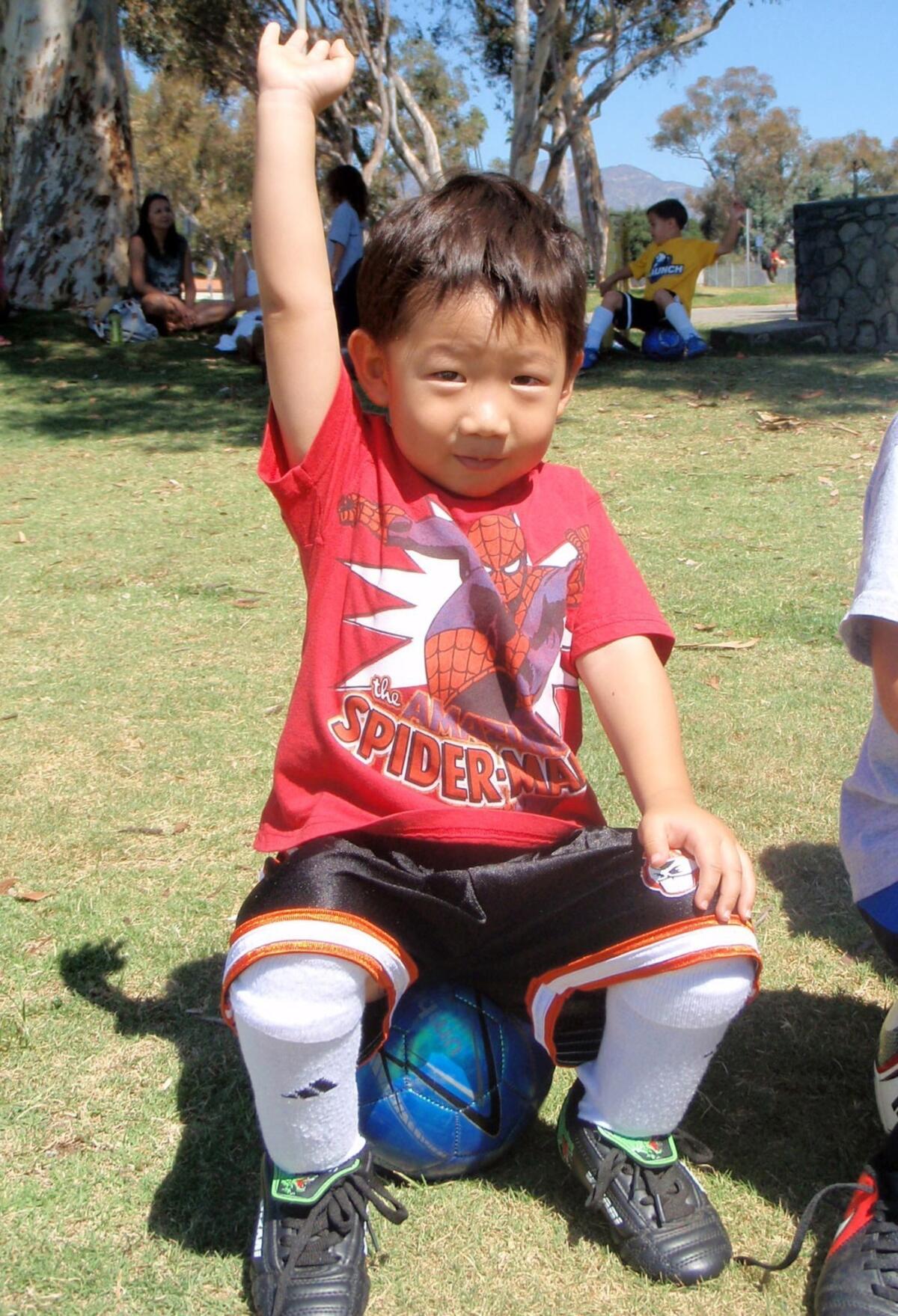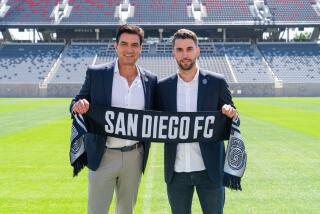Toddler soccer: Is it fun or folly?

- Share via
Baby Einstein? Meet Baby Ronaldo.
An L.A. soccer academy is targeting toddlers as young as 18 months, with a half-dozen students taking part in weekly classes to foster social and soccer skills at the earliest possible moment.
Note that some of the young strikers can’t speak yet and diapers are an issue. As they say, you’ve got to walk before you can run. These days, guess you have to dribble before you can run as well.
But, hey, don’t be so judgmental. Yet.
Because in the world of youth sports, just when you think you’ve seen it all, you haven’t really seen it all.
The toddler soccer classes were created by Stewart Cunningham, a former English youth star with a love of soccer and the realization that, for most young soccer players, too early may not be early enough.
“You have to start playing as young as possible because the competition is so severe,” he explained.
Hey Stew, is in utero an option?
To be fair, Cunningham seems to know his stuff, having taught toddler soccer for more than 15 years, in Europe and here in the States, where youngsters lag behind competing nations at the earliest ages, experts say. In Mexico and other soccer-obsessed nations, many kids begin playing at 2 and 3. In the U.S., most programs don’t start till 4 or 5.
Evidently, that may be changing.
“I’ve seen some impressive 2-year-olds,” says Omar Nuno, an instructor for Play 2 Grow, Cunningham’s company. “I’ve seen them hook the ball.”
“I’ve got 30 kids in the development league,” Cunningham said of his 6-and-under classes. “I’ve got five or six 18-month-olds.”
Play 2 Grow is affiliated with the widely known Launch Soccer Inc., which runs camps.
Tailored expressly for 18- to 24-month-olds, the outfit’s Panda program is “geared toward a toddler’s unique way of learning and includes parachutes, bubbles, cone towers and lots of scoring goals,” the company’s ads say.
Three other divisions — Tigers, Rhinos and Lions — cater to young players up to age 6.
“We do a lot of things with bubbles and colors,” Cunningham said.
“I think that every 18-month-old is ready,” he said. “The ones who are full of energy are the ones we’re really looking for. But there’s nobody I would turn away.”
“Oh, my God,” exclaimed Jordan Fliegel, founder of CoachUp, a Boston firm that works with young players and youth coaches across the country. “Eighteen months?”
“At that age, it should be entirely about having fun,” Fliegel says. “The wrong approach as a parent is to look at [youth sports] as a way to get a 6-year-old into college.”
Most parents are already familiar with the push to get a talented 7- or 8-year-old to join a club team made up of players from different communities. Essentially all-star teams, their fees can run well into the thousands, and the time commitment for players and their families can be crushing.
There are also rewards: college scholarships, pro careers. But those go only to a precious few, despite all the sacrifices and good intentions.
“It’s just gotten so crazy out there,” said Fred Engh, author of “Why Johnny Hates Sports” and president of the National Alliance of Youth Sports. “It all started with these travel teams.”
Pitching coaches. Batting instructors. Personal trainers.
For a country that doesn’t make anything anymore, we sure produce a lot of coaches, an industry preying on ridiculous expectations.
“It reminds me of the Old West when a guy came into town selling snake oil,” Engh said.
Extreme as it seems, there is no indication that Cunningham’s program isn’t strictly a fine way for 18-month-olds to blow off some of their endless energy. And it’s certainly preferable to sticking them in front of a television.
In his 10-week classes, Cunningham stresses fun and social skills for his 18-month-old charges.
“They like the same things over and over again — like with books and cartoons. That’s how they learn. By Week 3 of our class, they know that the next thing we’re going to do is bubbles.”
Cunningham’s classes are another sign that when it comes to youth sports, we haven’t yet seen it all. For instance, Cunningham is currently the “personal trainer” for a 3-year-old soccer player.
“It’s not about trying to find the next great player,” he insisted.
But, these days, too much of youth sports really is.
“The parents don’t see them as children,” said Engh, whose organization deals with such issues every day. “They see them as the next Tiger Woods.”
And we all know how well he turned out.
Twitter: @erskinetimes
Twitter: @erskinetimes
More to Read
Go beyond the scoreboard
Get the latest on L.A.'s teams in the daily Sports Report newsletter.
You may occasionally receive promotional content from the Los Angeles Times.











